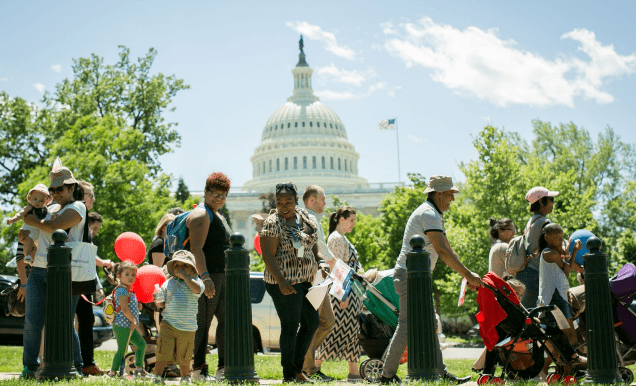Policymakers in several states passed budgets that include new investments for young children and families in recent months.
Although these are significant wins that should be celebrated, funding has still not returned to pre-recession levels in some states, and critical services for infants and toddlers are being cut in others. It is essential that we continue to Rally4Babies to ensure all children receive the services and supports they need. See below for details about state budget wins for babies:
- Virginia’s 2016-2018 biennial state budget increases funding for Healthy Families home visiting by $9.5 million, more than doubling its current funding. The budget also includes a $4.2 million increase for Part C early intervention, and $1.9 million for child care workforce scholarships and a competency-based credentialing system.
- Rhode Island allocated $8.4 million in state and federal funding to increase access to child care subsidies, the largest increase in more than a decade. The state also increased the state Earned Income Tax Credit (EITC) from 12.5% to 15% of the federal EITC.
- Michigan’s FY2017 budget includes significant resources to support the Flint water crisis, including $6.4 million for Part C early intervention, $8.1 million to expand eligibility for child care subsidies to 300% of the Federal Poverty Level (FPL) for families with children 0-3, and $15.1 million for an array of health and human service needs including evidence-based home visiting, a pediatric medical home model, and nutrition assistance.
- Only a few months after finalizing the FY2015-16 budget that was stalled for months, Pennsylvania finalized the FY2016-17 budget, which includes a $1 million increase for Part C early intervention.
- Minnesota finalized a supplemental budget in June that allocates $2 million to the state’s QRIS, $2 million to the Parent-Child Home home visiting program, and small amounts to place-based initiatives and supports for child care.
- Illinois increased the state’s Early Childhood Block Grant (ECBG) by $79 million in the 2017 budget for elementary and secondary education, restoring it to a historically high funding level of $393 million. The ECBG funds infant-toddler center-based and home visiting programs, as well as preschool programs. The governor also signed a bill requiring that 25% of new ECBG funds must be spent on infant-toddler programs beginning in FY2017.
- California’s recently passed budget includes a significant multiyear investment in early childhood, beginning with a $147 million increase in FY2016-17 that is expected to grow to more than $500 million in FY2019-20. Funds will support increases in reimbursement rates for child care and preschool providers so they can keep pace with the state’s rising minimum wage, align federal quality dollars with QRIS efforts, support an early childhood apprenticeship program, and expand access to preschool.
- Massachusetts’ FY2017 budget includes a $12.5 million rate reserve to support workforce salaries in early education and care programs that receive state child care subsidies, more than doubling the $5 million rate reserve funded last year. The legislature successfully overrode the governor’s veto of this budget item and others that would have eliminated state funding for Reach Out and Read and a family mentoring pilot program.
- Washington approved a new Collective Bargaining Agreement to increase funds for family child care providers. The $12.7 million package includes increases to the child care subsidy base rates and tiered reimbursement, annual quality improvement awards, and supports for training, coaching, and other quality improvement mechanisms.
Reviewed February 2019



